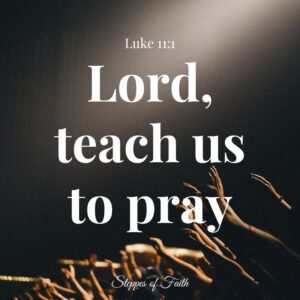
“Lord, teach us to pray.” (Luke 11:1)
Matthew 5-7 contains Jesus’ Sermon on the Mount spoken on the Mount of Beatitudes on the Sea of Galilee shore. Chapter six recounts His teaching about two ways to pray—the wrong way and the correct way.
He begins in verse five by urging the crowd to refrain from praying like the “hypocrites (the religious leaders),” who were widely known to pray openly in the streets near the synagogues. They assumed that such boisterous praying surely pleased God and set an example for others. Yet Jesus tells us that is the wrong way to pray.
“And when you pray, you shall not be like the hypocrites. For they love to pray standing in the synagogues and on the corners of streets that they may be seen by men. Assuredly, I say to you, they have their reward.” (Mt 6:5)
Jesus uses an older Greek translation of “hypocrites” here in verse five. It indicates one who wears a mask. Today, we might substitute the term “two-faced.” In the New Testament, it more commonly means to deceive oneself.
Jesus indicates the religious leaders are stubborn, untrustworthy, and self-centered. He goes on to say such men already have their reward, that is, the reward of being publicly seen by others. They are not concerned about what God thinks but only what men think. God cannot reward such behavior but promises to punish it (Mt 23:13-39).
Pray without Babbling
Secondly, Jesus teaches us not to repeat the same words when we pray.
“And when you pray, do not use vain repetitions as the heathen do. For they think that they will be heard for their many words.” (Mt 6:7)
One of the earliest manuscripts of the New Testament translates Matthew 6:7, saying, “When you pray, do not babble like the Gentiles.” Babbling refers to the gibberish that often appeared in magical spells written in ancient Greek texts. Like “abracadabra,” babble (or “vain repetitions”) was a nonsensical combination of repeated sounds meant to appear as if they had magical power. First-century Jews sometimes included these sounds when they prayed, but Jesus instructs us never to speak this way.
Ancient religious leaders also often composed prayers for their students to recite. Today, some may call these kinds of prayers mantras. They can be spoken or sung. But Jesus says we should never recite our prayers from a pre-determined script or formula. And they should never be spoken thoughtlessly.
Scripted or babbling prayers do not come from a sincere heart. Instead, God desires an intimate relationship with His children, who speak openly, honestly, and thoughtfully with Him.
But sometimes, it is hard to find the right words to say. If we are unsure what to pray, Jesus reassures us that God already knows what we need before we ask. Later in chapter six, Jesus repeats His lesson, referring to how He feeds the birds and clothes the fields with lilies. Why, then, should we worry?
“Therefore, do not worry, saying, ‘What shall we eat?’ or ‘What shall we drink?’ or “What shall we wear?’ For after all these things the Gentiles seek. For your heavenly Father knows that you need all these things. But seek first the kingdom of God and His righteousness, and all these things shall be added to you.” (v31-33)
The Bible also tells us that the Holy Spirit makes groanings for us, which means He hears our deepest prayers when we cannot express them because of grief or sorrow (Romans 8:26-27). God always hears our prayers whether we can say them or not.
The lesson is that we should never recite our prayers or babble endless nonsense. Every word should come genuinely from our heart.
Humility and Respect
So, how should we pray?
Jesus instructs us to do the opposite of everything the religious leaders were doing. They loved to pray loudly and openly in the streets for all to witness, but Jesus tells us to pray privately.
“But you, when you pray, go into your room, and when you have shut the door, pray to your Father who is in the secret place. And your Father, who sees in secret, will reward you openly.” (Mt 6:6)
God hears us when we pray; He also sees us. He sees our posture both spiritually and physically. It does not mean we must be alone in a closed room every time we pray. In fact, we are encouraged to pray with others (1 Cor 14:26). But whether privately or corporately, we should pray quietly, with humility and respect.
We might bend our knees, but if we cannot, we bow in our hearts. We shut out the world and talk “in the secret place” to our Lord. Doing otherwise only draws attention toward us and away from Him.
God is omnipresent (present everywhere at once) and omniscient (all-knowing). The Bible assures us that He always hears our prayers no matter where we are and sees our spiritual posture. Let us always approach the throne room with the proper respect and attitude, recognizing that we are approaching the God of the universe.

The ACTS Prayer
Since God already knows our needs before we ask, Jesus instructs us to pray following a suggested outline. We know this famous teaching as the Lord’s Prayer (Mt 6:9-13; Lk 1:2-4). He bases it on a prayer regularly recited by Jewish people called the Kaddish or the Mourner’s Kaddish. Its earliest form began “Exalted and hallowed be His great name in the world that He created according to His will. May He cause His kingdom to reign.”
[READ THE ENTIRE KADDISH IN ARAMAIC AND ENGLISH]
Many of us know the biblical Lord’s Prayer by heart. But again, we should never recite our prayers, not even this one. Therefore, the Lord’s Prayer is simply a pattern to follow.
The pattern can easily be remembered by the acronym ACTS.
- Adoration
- Confession
- Thanksgiving
- Supplication
Notice that the prayer’s exact order differs slightly from the acronym. Nevertheless, the elements are the same.
First, we offer God our praise and Adoration.
“Our Father in heaven,
Hallowed be (Holy is) Your name.
Your kingdom come; Your will be done on earth as it is in heaven.” (v9-10)
We can customize our praise however we wish. God is worthy of all praise in all forms. He sent His Son, Jesus, to die on the cross to pay our sin debt forever, and then He rose again to life to give us not only a path to eternal life but also a way for us to speak directly with the Father. He then sent His Spirit to dwell within all believers so we never have to endure the world alone.
Truly, He is worthy of adoration!
Confess and Forgive
Second, we Confess our sins to Him.
“And forgive us our debts as we forgive our debtors.” (v12)
We are all born into sin. Therefore, we are all in debt to God for violating His laws. We might ask forgiveness for specific sins we have knowingly committed, but we should also ask forgiveness for those we do not recall.
Under Mosaic Law in the Old Testament, God commanded that the Israelites keep a whopping 613 laws. As believers in Christ saved by His grace, we are not required to keep hundreds of specific laws, but it does indicate that we are likely to commit more sins than we realize. Assuming this is so, we might also consider it reasonable to ask forgiveness for those sins.
Notice, too, that Jesus says we should forgive others as God forgives us. If He forgives us willingly and freely, then we ought to forgive others the same way. It is easier said than done for many. Nevertheless, Jesus commands in verses 14-15 that we continually strive to practice it no matter how difficult it can be.
“For if you forgive men their trespasses, your heavenly Father will also forgive you. But if you do not forgive men their trespasses, neither will your Father forgive your trespasses.”
Jesus is not saying that God will withdraw His justification from those who have accepted Jesus as Lord and Savior. Be assured that His salvation is permanent and eternally secure (Jn 5:24; Rom 8:1; Eph 1:7). But like a good father, He will discipline those who disobey Him (Heb 12:5-7) by withholding His blessings.
Therefore, we confess our sins daily (1 Jn 1:9) so He can wash us from worldly corruption. It is not the same as our initial acceptance of salvation but akin to washing our hands instead of taking an entire bath. Jesus illustrates this principle in Matthew 18:23-35.

Pray with Thanksgiving and Persistence
According to the Lord’s Prayer, we next offer Thanksgiving.
“For Yours is the kingdom and the power and the glory forever.” (v13)
Many believers move this part of prayer to the end. But again, all that matters is that we include it. We might offer thanksgiving in conjunction with giving adoration. We might also “bookend” our prayer with adoration at the beginning and thanksgiving at the end, or vice versa. What is most important is that we offer it since He is the source of all we have.
Finally, we offer Supplication. These are our prayer requests. The Bible tells us to make our requests known along with our thanksgiving every time we pray.
“Be anxious for nothing, but in everything by prayer and supplication, with thanksgiving, let your requests be made known to God.” (Phil 4:6)
One aspect of Jesus’ death on the cross is that it opened a way for us to pray directly to the Father. We no longer need a human intermediary; Jesus now intercedes for us as our great high priest (Rom 8:34; Jhn 17:6-26; Heb 7:25-28; Heb 4:14-16). Therefore, we can confidently approach Him with our requests with the assurance that He hears us.
“Let us therefore come boldly to the throne of grace, that we may obtain mercy and find grace to help in time of need.” (Heb 4:16)
God also invites us to be persistent when we pray. Jesus tells a parable in Luke 18 about a widow who would not leave a judge alone until she got justice. Though the judge was known to be biased and unfair, she relentlessly demanded justice for her case. Eventually, the judge avenged her. Jesus’ point is that if an unjust judge willingly answered a persistent widow, how much more would God do for His children when they pray?
“And shall God not avenge His own elect who cry out day and night to Him, though He bears long with them? I tell you that He will avenge them speedily.” (Lk 18:7-8)
Prayer is vital to a healthy relationship with God. Endeavor to approach His throne of grace with quiet confidence, humility, honesty, sincerity, and authenticity. Enter His courts with praise and thanksgiving (Psalm 100:4) and make your petitions known. When we pray with the respect and honor He deserves, we experience His righteous response and blessing.
“You are worthy, O Lord, to receive glory and honor and power, for You created all things.” (Rev 4:11)
“Worthy is the Lamb who was slain to receive power and riches and wisdom and strength and honor and glory forever! Blessing and honor and glory and power be to Him who sits on the throne, and to the Lamb, forever and ever!” (Rev 5:12, 13)
